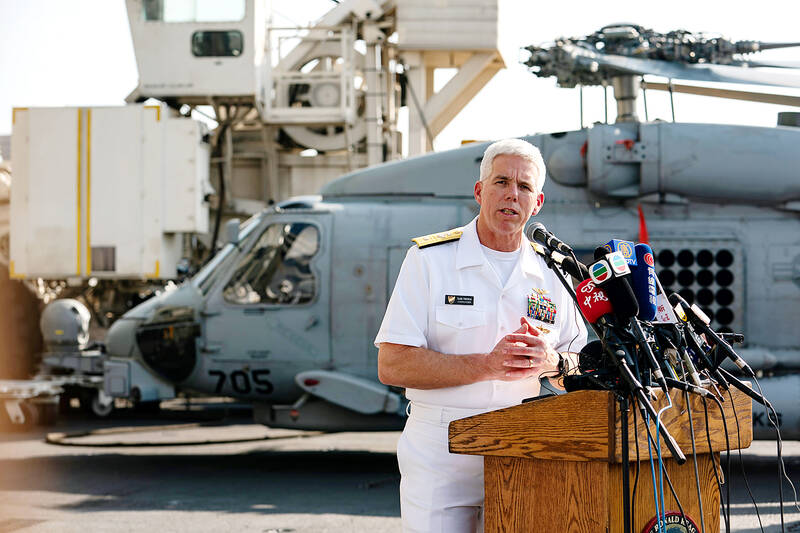The Chinese navy has the ability to blockade Taiwan, but doing so could prompt a coordinated response by the international community to intervene to resolve the crisis for Taiwan, US Vice Admiral Karl Thomas said.
“Clearly if they do something that’s non-kinetic, which, you know, a blockade is less kinetic ... then that allows the international community to weigh in and to work together on how we’re going to solve that challenge,” the commander of the US Navy’s 7th Fleet told the Wall Street Journal in an interview published on Monday.
While he could not predict whether China would launch a full-scale attack on Taiwan or blockade the nation, it was his job to be ready for all eventualities, he said.

Photo: Bloomberg
Following a visit by US House of Representatives Speaker Nancy Pelosi to Taipei on Aug. 2 and 3, the Chinese People’s Liberation Army (PLA) launched live-fire military exercises in six maritime zones around Taiwan, firing 11 ballistic missiles into waters surrounding the nation.
The “irresponsible” act showed that China was pushing the boundaries further to “see what they can get away with,” Thomas said.
Following the exercises, China has made dozens of incursions near Taiwan during which PLA aircraft or ships crossed the median line of the Taiwan Strait, which had served as a tacit boundary before last month’s military exercises.
China’s latest actions are an extension of its “might makes right” mentality, Thomas said.
Asked why the plane carrying Pelosi avoided the South China Sea and followed a circuitous path to Taiwan, Thomas said that it was done to avoid provoking China, which has militarized artificial islands in the region.
The decision was made “at high levels” amid warnings from Beijing that a visit by Pelosi could have consequences, he added.
China, which has the world’s largest navy by size, is building warships at a faster rate than the US, although the US Navy, with more advanced warships and a larger aircraft carrier fleet, still has a qualitative edge, Thomas said.
The PLA has also been addressing a lack of coordination between its different branches, which had been seen as weaknesses, he said, adding that aircraft from China’s air force now fly above bodies of water, while in 2018 only aircraft from its navy conducted such flights.

Taiwan is projected to lose a working-age population of about 6.67 million people in two waves of retirement in the coming years, as the nation confronts accelerating demographic decline and a shortage of younger workers to take their place, the Ministry of the Interior said. Taiwan experienced its largest baby boom between 1958 and 1966, when the population grew by 3.78 million, followed by a second surge of 2.89 million between 1976 and 1982, ministry data showed. In 2023, the first of those baby boom generations — those born in the late 1950s and early 1960s — began to enter retirement, triggering

ECONOMIC BOOST: Should the more than 23 million people eligible for the NT$10,000 handouts spend them the same way as in 2023, GDP could rise 0.5 percent, an official said Universal cash handouts of NT$10,000 (US$330) are to be disbursed late next month at the earliest — including to permanent residents and foreign residents married to Taiwanese — pending legislative approval, the Ministry of Finance said yesterday. The Executive Yuan yesterday approved the Special Act for Strengthening Economic, Social and National Security Resilience in Response to International Circumstances (因應國際情勢強化經濟社會及民生國安韌性特別條例). The NT$550 billion special budget includes NT$236 billion for the cash handouts, plus an additional NT$20 billion set aside as reserve funds, expected to be used to support industries. Handouts might begin one month after the bill is promulgated and would be completed within

The National Development Council (NDC) yesterday unveiled details of new regulations that ease restrictions on foreigners working or living in Taiwan, as part of a bid to attract skilled workers from abroad. The regulations, which could go into effect in the first quarter of next year, stem from amendments to the Act for the Recruitment and Employment of Foreign Professionals (外國專業人才延攬及僱用法) passed by lawmakers on Aug. 29. Students categorized as “overseas compatriots” would be allowed to stay and work in Taiwan in the two years after their graduation without obtaining additional permits, doing away with the evaluation process that is currently required,

IMPORTANT BACKER: China seeks to expel US influence from the Indo-Pacific region and supplant Washington as the global leader, MAC Minister Chiu Chui-cheng said China is preparing for war to seize Taiwan, Mainland Affairs Council (MAC) Minister Chiu Chui-cheng (邱垂正) said in Washington on Friday, warning that Taiwan’s fall would trigger a regional “domino effect” endangering US security. In a speech titled “Maintaining the Peaceful and Stable Status Quo Across the Taiwan Strait is in Line with the Shared Interests of Taiwan and the United States,” Chiu said Taiwan’s strategic importance is “closely tied” to US interests. Geopolitically, Taiwan sits in a “core position” in the first island chain — an arc stretching from Japan, through Taiwan and the Philippines, to Borneo, which is shared by